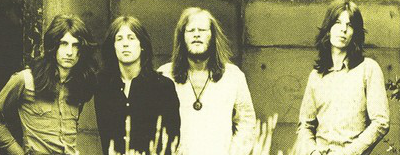Members
4
Origin
 ---
---
Genre
 Blues
Blues
Style
 Rock/Pop
Rock/Pop
Mood
---
Born
4
Origin
Genre
Style
Mood
---
Born
![]() 1968
1968
Active![]() 1968 to Present...
1968 to Present...
Cutout![]()
3 users
3 users
3 users
3 users
3 users
Artist Biography
Available in:
Steamhammer was a blues-rock band from Worthing, England, whose origins were with the blues. The band was founded in 1968 by Martin Quittenton (guitar) and Kieran White (vocals, guitar, harmonica). The first stable line up consisted of Quittenton, White, Martin Pugh (guitar), Steve Davy (bass), and Michael Rushton (drums).
The first version of Steamhammer acted as backing band for Freddie King on two of his tours of England between 1968-1969. Like many of their peers, the band experimented with instrumental passages, introspective lyrics, and ultrasonic guitar effects, along with folk, jazz and classical influences. After playing in English pubs in the late 1960s, Steamhammer’s self-titled album Steamhammer (aka Reflection) debuted on Columbia Records in 1968, featuring their single, “Junior's Wailing," and including covers of "You'll Never Know" by B. B. King and "Twenty Four Hours" by Eddie Boyd as well as original songs by White, Quittenton, and Pugh. Session musicians Harold McNair (flute) and Pete Sears (piano) also played on the album. While the album was not commercially successful, the band’s sound became popular live, especially in West Germany. In the summer of 1969, Quittenton and Rushton left the band, and Steve Jolliffe (saxophone, flute) and Mick Bradley (drums) joined the band.
The second version of the band recorded the album Mk II, released in 1969. It consisted entirely of original songs, and the musical style had more jazz and progressive rock influences. Jolliffe left the band in 1970. The remaining band members recorded the album Mountains, which was released in 1970. This album included a cover of "Riding on the L & N" by Lionel Hampton and seven original songs.
In 1970, White and Davy left the band, and Louis Cennamo (bass) (formerly of the original line up of Renaissance) joined the band. This line up, along with session vocalist Garth Watt-Roy, recorded the album Speech, which was released in 1972. It consisted of three long, mostly instrumental songs. The genesis of Armageddon began with this final Steamhammer album, produced by ex-Yardbird and Renaissance frontman, Keith Relf.
Bradley died of undiagnosed leukemia on February 8, 1972, aged 25. A memorial concert took place at London's Marquee Club on 14 March that year, with appearances by fellow bands Atomic Rooster, Beggars Opera, If, and Gringo). Steamhammer carried on for a while with a new drummer, John Lingwood, and lead singer, Ian Ellis (ex-Clouds). The new line up debuted at London's Imperial College on 3 May, followed by a European tour in May and UK tour in June with American vocalist/guitarist Bruce Michael Paine replacing Ellis. In June 1973, it was announced that they would now perform as Axis, playing their first gig under that name at the Marquee on 15 June. Quittenton rejoined, but the band split towards the end of 1973.
In 1974, two years after drummer Bradley's death, Relf sought Cennamo and Pugh out to form a band in California. Armageddon emerged in late 1974, and Rolling Stone magazine ran two articles on them before they had a drummer, a contract, or even a name for themselves. Relf brought in Bobby Caldwell on drums, and introduced the band to A&M Records producer Jerry Moss. Half a song into a set at the Charlie Chaplin Sound Stage in Hollywood, Moss signed Armageddon. Armageddon released a self-titled effort in 1975. Armageddon never toured, due to another string of setbacks that stunted their momentum. Foremost was Relf's battle with asthma, which forced him to retire in 1976, and he died in May that year.
Pugh and Caldwell tried to reassemble Armageddon in the early 1980s, producing a number of songs for a second LP for Capitol Records with singer Jeff Fenholt (of Jesus Christ Superstar), and were close to signing contract when personality conflicts forced the band apart. Caldwell eventually returned to Captain Beyond, Cennamo later rejoined the original Renaissance line up (then known as Illusion) and later worked with Jim McCarty in Stairway. Pugh left the music business but stayed in California, eventually emerging from retirement to sit in with US-based rock and roll band 7th Order in 2002-2003.
After his days with Steamhammer, White recorded a solo album, Open Door, which was released in 1975. White died in 1995 of cancer. Quittenton played guitar and co-wrote songs, including "Maggie May" and "You Wear It Well" on albums by Rod Stewart. Jolliffe joined Tangerine Dream in 1978, and played on the album Cyclone.
Wide Thumb
Clearart
Fanart
Banner
User Comments
 No comments yet..
No comments yet..

 40%
40%



